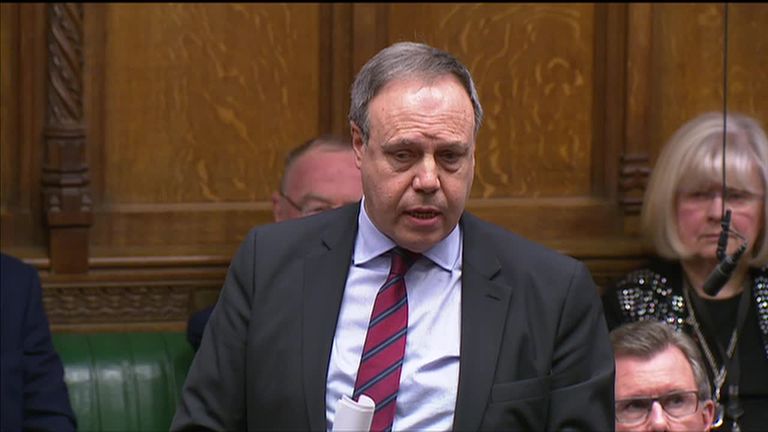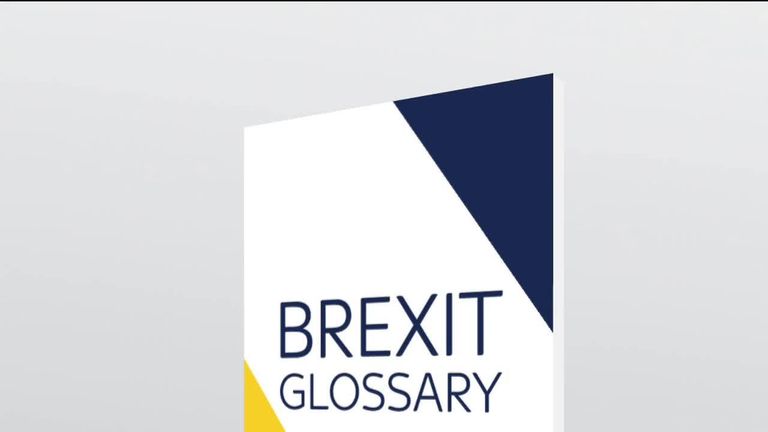Fee for EU nationals scrapped as May promises Brexit backstop talks
The PM reveals the 拢65 charge to apply for settled status will be waived as she once again refuses to rule out a "no deal" Brexit.
Tuesday 22 January 2019 00:03, UK
Theresa May has scrapped a fee for EU nationals seeking settled status in Britain after Brexit, as she pledged more talks around the controversial Irish border backstop.
EU nationals living in the UK have been required to pay £65 when applying for settled status with the Home Office to process their application, but Mrs May announced she was waiving that fee as she outlined her next steps on Brexit in the Commons.
The PM said anyone who already paid the fee would be refunded.
She refused once again to rule out a "no-deal" Brexit, but promised the House she would take a "flexible, open and inclusive" approach to involving Parliament in negotiating the future relationship with the EU, with more talks planned for this week.
In her statement Mrs May:
:: Refused to rule out leaving the EU with no deal, saying the House must approve a deal or revoke Article 50
:: Said a second referendum would "set a difficult precedent" and "damage social cohesion"
:: Denied considering reopening the Good Friday Agreement in order to solve the backstop problem
:: Said the government would consult the House on its negotiating mandate to ensure MPs feel they are being heard
:: Said a new motion will be laid before the House on 29 January
Mrs May said she would speak with the leaders of the Welsh and Scottish governments as part of the ongoing talks before returning to Brussels with more feedback on the backstop.
She criticised Labour leader Jeremy Corbyn for not - so far - taking up her offer of talks on Brexit.
Mrs May promised to speak to the DUP to "consider how we might meet our obligations to the people of Northern Ireland and Ireland in a way that can command the greatest possible support in the House".
It comes as Poland broke ranks with the rest of the EU and suggested the deadlock over the backstop could be solved if a five-year time limit was added.
Mr Corbyn has not met with the prime minister so far, saying he will not do so unless "no-deal" is off the table.
If no deal is struck with the EU before 29 March - when the two-year negotiating window in place under Article 50 of the Lisbon Treaty ends - the UK will leave on World Trade Organisation terms.
Mrs May addressed the House of Commons after a weekend spent at Chequers, where she considered how to proceed following the overwhelming rejection of her deal by MPs in the "meaningful vote" on Tuesday.
But many MPs said her plan B was remarkably similar to her plan A.
Mr Corbyn said: "What makes her think that what she tried to renegotiate in December will succeed in January?
"This really does feel a bit like Groundhog Day."
He pushed her to rule out a "no-deal" Brexit, and "stop the colossal waste of money" in preparing for it.
The Labour leader added: "No more phoney talks. Parliament will debate and decide and this time I hope and expect the Government to listen to this House."
But Mrs May hit back and said: "He says no more phoney talks, it'll be nice just to have some talks with him on this issue.
"He makes lots of claims about what has been said in the talks held so far, but actually he doesn't know because he didn't turn up to these talks."
Mrs May faced questions from MPs, including from some of her former ministers, and in her answers she refused to rule out extending Article 50 or getting legal changes to the withdrawal agreement.
Former foreign secretary Boris Johnson asked: "Can she confirm that in so doing she will now seek legally binding change to the text of that backstop and to the text of the Withdrawal Agreement itself?"
Mrs May said: "What we're doing is exploring, with members across this House, the nature of any movement on the backstop that would secure the support of this House.
"There are a number of options - we will look to see what is going to secure the support of the House."
Dominic Raab, the former Brexit secretary, asked the PM to rule out revoking or extending Article 50 to give businesses certainty.
She said: "What I'm working for is to find a deal that will secure the support of this House such that we can leave and will leave the European Union on March 29."
The issue of the backstop has proved divisive in the Commons, and Poland's foreign minister Jacek Czaputowicz added to the debate.
He told the Rzeczpospolita newspaper: "If Ireland asked the EU to amend the agreement with the British on the backstop so that it would apply temporarily - let's say five years - the matter would be solved.
"It would obviously be less favourable for Ireland than an indefinite backstop, but much more advantageous than no-deal Brexit."
MPs will now be able to vote on a "neutral motion" being tabled by the PM on 29 January.
Senior Labour MP Yvette Cooper and former Tory minister Nick Boles are leading a group of MPs seeking to give time for a bill to suspend the Article 50 process if there is no deal by the end of February.
They want to extend the negotiation period for an agreement to the end of the year.
The bill states: "If, before 26 February 2019, the House of Commons has not passed a resolution approving the negotiated withdrawal agreement and the framework for the future relationship... the Prime Minister must no later than 26 February, move a motion in the House of Commons...
"That this House directs the Prime Minister to seek an extension of the period of two years specified in the article 50... to a period ending 31 December 2019."
The bill emerged after Labour's amendment calling for changes to the agreement to introduce a permanent customs union with the EU and a second public vote was voted down in the Commons.
Dominic Grieve, former attorney general, has drawn up a more radical amendment which would allow a motion by a minority of 300 MPs from five parties, including 10 MPs, to be debated as the first item of Commons business.








